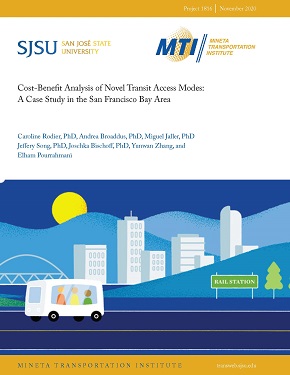- 408-924-7560
- mineta-institute@sjsu.edu
- Donate
Cost-Benefit Analysis of Novel Access Modes: A Case Study in the San Francisco Bay Area
The first-mile, last-mile problem is a significant deterrent for potential transit riders, especially in suburban neighborhoods with low density. Transit agencies have typically sought to solve this problem by adding parking spaces near transit stations and adding stops to connect riders to fixed-route transit. However, these measures are often only short-term solutions. In the last few years, transit agencies have tested whether new mobility services, such as ridehailing, ridesharing, and microtransit, can offer fast, reliable connections to and from transit stations. However, there is limited research that evaluates the potential impacts of these projects. Concurrently, there is growing interest in the future of automated vehicles (AVs) and the potential of AVs to solve this first-mile problem by reducing the cost of providing these new mobility services to promote access to transit. This paper expands upon existing research to model the travel and revenue impacts of a fleet of automated vehicles that provide transit access services in the San Francisco Bay Area offered over a range of fares. The model simulates a fleet of AVs for first-mile transit access at different price points for three different service models (door-to-door ridehailing and ridesharing and meeting point ridesharing services). These service models include home-based drop-off and pick-up for single passenger service (e.g., Uber and Lyft), home-based drop-off and pick-up for multi-passenger service (e.g.,microtransit), and meeting point multi-passenger service (e.g., Via).
Caroline Rodier
Dr. Caroline Rodier is a Researcher at the Institute of Transportation Studies, University of California, Davis (UC Davis). Her primary areas of research include transport, land use, and environmental policy analysis. Her current modeling research involves the travel and equity effects and financial sustainability of alternative new shared mobility systems (e.g., transit-based and regional ridehailing and ridesharing), including automated vehicles.
Andrea Broaddus
Dr. Andrea Broaddus is a transportation policy expert focused on managing the demand for travel through behavioral incentives and land use practices. She has published articles on road pricing and transit-oriented development and has served as a lecturer at UC Berkeley and San Jose State since 2010.
Miguel Jaller
Miguel Jaller is an Associate Professor in Civil and Environmental Engineering at UC Davis. Dr. Jaller’s research interests are in the areas of freight transportation, sustainable transportation systems, and humanitarian logistics. He has published scientific and technical publications on these topics and has presented at different national and international venues.
Jeffery Song
Jeffery Song is a postdoctoral researcher in the 3 Revolutions Future Mobility Program at the University of California, Davis. He earned his PhD at Carnegie Mellon University in Engineering and Public Policy.
Joschka Bischoff
Dr. Joschka Bischoff is currently a simulation expert at the Swiss Federal Railways as part of the business development team. He recently received his PhD from the Technical University of Berlin. He is a recognized expert in the simulation of automated vehicle systems.
Yunwan Zhang
Yunwan Zhang is a research data analyst at the Institute of Transportation Studies, University of California, Davis. She earned her Masters of Science degree in Civil and Environmental Engineering at UC Davis.
-
Contact Us
SJSU Research Foundation 210 N. 4th Street, 4th Floor, San Jose, CA 95112 Phone: 408-924-7560 Email: mineta-institute@sjsu.edu






